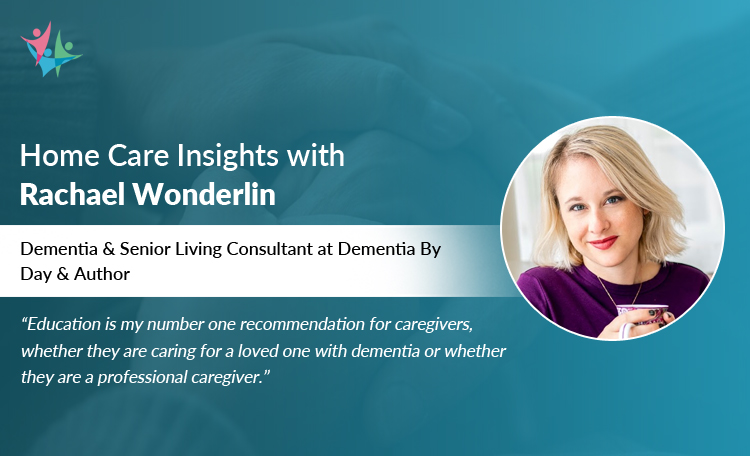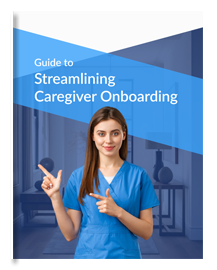In Conversation with Rachael Wonderlin to Bring Her Insights on Elderly Dementia Support
In elderly dementia support, caregivers are the unsung heroes, weaving the threads of comfort and companionship. In the quiet spaces between forgotten moments, these dedicated souls breathe life back into fading memories. Through patience and understanding, they navigate the labyrinth of dementia, offering a steady hand and a warm smile.
It’s where lost fragments of the past find meaning again and where the simple act of listening becomes a powerful affirmation of one’s existence. In this nurturing environment, caregivers don’t just assist; they infuse each day with dignity, allowing the elderly to rediscover their worth and find solace in embracing understanding hearts.
To shed some light on the same, we interviewed a home care industry expert to bring her perspective on caring for a senior with dementia.

Who Did We Interview?
Rachael Wonderlin, a revered dementia care expert and published author with a Master’s in Gerontology, helms Dementia By Day, a renowned consulting firm. She transforms senior living communities worldwide, reshaping dementia care paradigms. Rachael educates caregivers globally through her blog, podcast, and YouTube channel.
Her groundbreaking work, featured in esteemed publications like The Washington Post and Forbes, includes the widely circulated “16 Things I’d Want If I Got Dementia” poem.
Recognized with prestigious awards, she trademarked innovative communication techniques like Embracing Their Reality™ and Timeline Confusion™. Rachael’s transformative impact extends to mentoring award-winning projects, notably guiding English Meadows to win first place in Senior Housing News’ 2022 Aspect Awards. Under her leadership, Dementia By Day served as a Gold Sponsor for the Senior Housing News’ BRAIN Conference in July 2023, reaffirming her pivotal role in revolutionizing dementia care globally.
Let’s get started with knowing what our expert thinks about supporting and protecting dementia residents.
Question 1: What, in your opinion, can caregivers do to support seniors with dementia?
Education is my number one recommendation for caregivers, whether they are caring for a loved one with dementia or whether they are a professional caregiver. I meet many caregivers whose frustration with their loved ones comes from a fundamental lack of understanding of dementia. Check out my books, my content on YouTube, my Patreon. I’ve developed these resources so caregivers feel supported and empowered rather than isolated and confused. In turn, they can ensure the best care possible for their loved ones.
In particular, my book The Caregiver’s Guide To Memory Care And Dementia Communities is a great resource. Caregivers often ask me: How/when will they know it’s time to move their loved one with dementia to a memory care community? The time inevitably comes, and this book answers that question and guides us in navigating this transition.
Question 2: Do dementia patients need to make lifestyle changes to minimize the impact?
So, some terminology is important to address, and I hope you’ll forgive my correction and receive it in the spirit in which it is intended: education. Only medical professionals like doctors and nurses should be referring to people with dementia as their patients. When referring to folks who live in memory care communities, we should call them residents. That community is their home, not a hospital.
There are myriad causes for dementia (which researchers have not yet fully understood), and dementia progresses differently for everyone. However, it is important to point out that once diagnosed, the dementia will not “get better.” This doesn’t mean people with dementia can’t have fulfilling, happy lives.
The answer to this question is rather case-dependent and will differ from one person living with dementia to another.
I wrote my poem, “16 Things I Would Want If I Got Dementia,” about lifestyle elements I think people with dementia should keep or even have help improving. At the core of these suggestions is that people with dementia should still be part of the family/community and enjoy versions of their favorite activities, even while living with dementia.
I also developed a mini-course based on my poem that takes a deep dive into each item from “16 Things” and teaches you how to apply each point in your everyday life as a care partner.
Question 3: How should family members and caregivers communicate with dementia patients?
We should always Embrace Their Reality™ when communicating with people living with dementia. This is a huge topic and can’t be totally addressed here, but you can learn more on my blog.
- Never quiz someone with dementia. (e.g., “Do you know who I am?” “What day is it?” etc.)
- Be patient with repetitive questions.
- Don’t overload people living with dementia with a lot of information at once.
- Talk to them like the adults that they are, not like children.
You can find more about these topics on my blog.
Question 4: Do caregivers and family members need to take certain steps to make the elderly’s house dementia friendly?
Not every older adult has dementia, but I can speak to some dementia-friendly modifications and precautions that can be taken in the home of someone with dementia.
One important safety rule for people living with dementia is that the memory care community in which they are living should be locked. I filmed an entire YouTube video recently on this very topic. “Elopement,” or leaving where they live, can be a huge safety risk for people with dementia, as the world outside of their home is scary and confusing to them, and they can potentially walk quite far!
But there are also many common misconceptions about what “isn’t safe” for people with dementia. I often hear that people with dementia shouldn’t be allowed to use knives when they eat. Still, this is rarely dangerous if someone has proven themselves to be a danger to themselves or others. Let people with dementia use butter knives when eating their meals!
Another concern I often hear from families and memory care communities is that residents enter each other’s rooms. People with dementia often don’t have boundaries around what belongs to them and where they’re “allowed” to wander. The memory care community is their home. Let them wander. Putting a big STOP sign at the door will not stop them.
I developed an eKit with practical, actionable, dementia-friendly design advice, which you can find here.
Question 5: What advice do you give to caregivers dealing with dementia older adults?
Here, I must echo my response to Question 1. Education is key! The other advice I have for caregivers is to reach out for support. Caregiving can sometimes feel isolating, so I developed my Family Support Group. Caregivers are often surprised at how much they share in common. Finding a community of fellow dementia caregivers is a game-changer. Also, take deep breaths, have empathy and patience, and practice self-care.
In Conclusion
Caregivers need education and support to help their loved ones facing memory challenges. Understanding, patience, and Embracing Their Reality™️ are vital. Home adjustments should focus on safety, not restrictions, ensuring a comfortable living space. Connecting with others in similar situations and self-care are crucial for caregivers’ well-being and the ones they care for.
